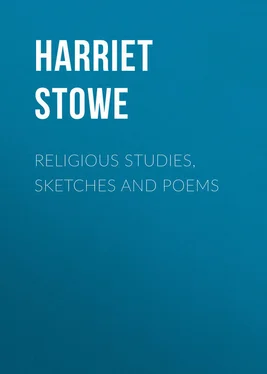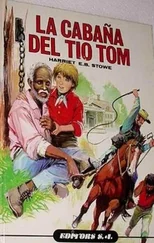Harriet Stowe - Religious Studies, Sketches and Poems
Здесь есть возможность читать онлайн «Harriet Stowe - Religious Studies, Sketches and Poems» — ознакомительный отрывок электронной книги совершенно бесплатно, а после прочтения отрывка купить полную версию. В некоторых случаях можно слушать аудио, скачать через торрент в формате fb2 и присутствует краткое содержание. Жанр: foreign_prose, на английском языке. Описание произведения, (предисловие) а так же отзывы посетителей доступны на портале библиотеки ЛибКат.
- Название:Religious Studies, Sketches and Poems
- Автор:
- Жанр:
- Год:неизвестен
- ISBN:нет данных
- Рейтинг книги:5 / 5. Голосов: 1
-
Избранное:Добавить в избранное
- Отзывы:
-
Ваша оценка:
- 100
- 1
- 2
- 3
- 4
- 5
Religious Studies, Sketches and Poems: краткое содержание, описание и аннотация
Предлагаем к чтению аннотацию, описание, краткое содержание или предисловие (зависит от того, что написал сам автор книги «Religious Studies, Sketches and Poems»). Если вы не нашли необходимую информацию о книге — напишите в комментариях, мы постараемся отыскать её.
Religious Studies, Sketches and Poems — читать онлайн ознакомительный отрывок
Ниже представлен текст книги, разбитый по страницам. Система сохранения места последней прочитанной страницы, позволяет с удобством читать онлайн бесплатно книгу «Religious Studies, Sketches and Poems», без необходимости каждый раз заново искать на чём Вы остановились. Поставьте закладку, и сможете в любой момент перейти на страницу, на которой закончили чтение.
Интервал:
Закладка:
Harriet Beecher Stowe
Religious Studies Sketches and Poems
INTRODUCTORY NOTE
No one can read Mrs. Stowe's writings as a whole without perceiving how constant is the appeal to the religious sensibilities. Her greatest book, which took captive the humblest reader and such a genius in literature as George Sand, was in a marked degree a religious book; and again and again, even in playful scenes, there is a quick passage to the religious nature. The explanation is in the simple fact that Mrs. Stowe herself from early girlhood to her latest years was governed by religion, and it is not surprising, therefore, that an entire volume should be gathered from her writings exclusively given over to direct expression of religious feeling and thought.
She would gladly, especially in her later life, have confined herself to writing of this sort, for the realities of faith, especially the presence of the Divine Master, came to have a commanding power over her mind and heart, and to make her almost impatient of much concern about adventures of the ordinary sort. Even the reminiscence of the racy life of the New England of her childhood could not absorb her. "I would much rather," she writes in 1876 to her son Charles, "have written another such a book as Footsteps of the Master , but all, even the religious papers, are gone mad on serials." The book which she was then writing was Poganuc People , and the reader knows what a thread of religious experience runs through that lively narrative.
Footsteps of the Master was published in 1877. In its original form, each section contained interludes of verse, sometimes her own, more frequently hymns and poems from well-known sources. There were also scriptural passages illustrative of the great divisions, and the book was set forth thus as a devotional companion. In reissuing it in this volume, the poems by the author have been preserved in the section given to her Religious Poems; the others and the illustrative scriptural passages have been omitted and Mrs. Stowe's Meditations preserved in their continuous form. The word "To the Reader," prefixed to the volume, is as follows: —
When a city is closely besieged and many of its outworks destroyed, the defenders retreat to the citadel. In our day there is warm fighting about the outworks of Christianity. Many things are battered down that used to be thought indispensable to its defense. It is time to retreat to the citadel; and that citadel is Christ.
The old mediæval symbol shown above 1 1 The familiar combination of Rex. Lux, Lex, Dux.
is still more than ever good for our day. Jesus Christ of Nazareth is still our King, our Light, our Law, our Leader. These names comprise all that a human being needs in this transitory, perplexing and dangerous pilgrimage of life.
We are born to suffer. The very conditions of our mortal existence here imply suffering of the most terrible kind as a possibility, a probability, or a certainty. We have affections absorbing our whole being which are hourly menaced by danger and by death – at any moment our sweetest joys may become sources only of bitterest remembrance.
We are born to perplexity. We stand amid the jar and conflict of a thousand natural laws, to us inexplicable, and which every hour threaten us in ourselves or those dearer than ourselves. We stand often in no less perplexity of moral law in ways where the path of duty and right is darkened and beset.
We are born to die. At the end of every possible road of life lies the dark River – the unknown future. If we cling to life, it is only to see it wither gradually in our hands, to see friends dropping from our side, places vacant at our fireside, infirmities and pains gathering about us, and a new generation with their impetuous energies rising around us to say, Why do you wait here? Why are you not gone?
And the Hereafter? What is it? Who will go with us into that future where no friend, however dear, can accompany the soul? What hand of power and love will take ours in the last darkness, when we have let go all others?
The dear old book which we call the Bible gives our answer to all this. It tells us of a Being so one with the great Author of nature and Source of all power that whoso hath seen him hath seen the Creator. It tells us that all things that we behold in our material world were made by him and for him: that it pleased the Father that in him should all fullness dwell, and that to him all things in heaven and on earth are made subject. It shows him to us from the beginning of time as constantly absorbed in the care and education of this world of ours. He has been the Desire of all nations – predicted, waited for, come at last!
And when he came and lived a mortal life what did he show the divine nature to be? It may all be told in one word: – LOVE. Love, unconquered, unconquerable by human sin and waywardness. Love, sympathetic with the inevitable sorrows of human existence. Love, expressed in every form by which a God could express love. His touch was healing; the very hem of his garment had restoring virtue. He lived and loved as we live and love, only on a higher ideal, – he gave to every human affection a more complete interpretation, a more perfect fullness. And finally, as the highest revelation of Love, he died for us, and in anguish and blood and dying pains still loved, still prayed for us, the ungrateful race of man. He passed through the night of death that he might learn not to fear it, and came forth radiant and immortal to tell us that we shall never die.
By a refinement of infinite mercy, the law of our lives is written not in hard statutes but in the life of this tender and sympathetic friend. Christ is our law. We learn courage, patience, fortitude, forgiving love from him. The lesson impossible in statute is made easy by sympathy. But lest the very brightness of the ideal fill us with despair we have his promise, "Lo, I am with you alway to the end of the world! I will not leave you comfortless. I will come to you." Jesus, as an inseparable soul-friend – a consoler, a teacher, an enlightener – dwells on earth now in a higher sense than when he walked the hills of Palestine.
"Forever more beside us on our way,
The unseen Christ doth move,
That we may lean upon his arm and say,
'Dost thou, dear Lord, approve?'"
To that great multitude whom no man can number, who are living the hidden life of faith, these studies into the life of our Master are dedicated. They have been arranged in the order of the seasons of the Christian year, with the hope of aiding the efforts of those who wish at these sacred seasons to bring our Lord more clearly to mind.
We hear much of modern skepticism. There is, perhaps, no more in the world now than there has always been, only its forms are changed. Its answer lies not in argument, but in the lives of Christ's followers. It was Christians who lived like Christ that won the first battle for Christianity, and it must be Christians who live like Christ that shall win the last. The life of faith in the Son of God, when fully lived out, always has been and always will be a victorious argument.
But to live this our faith must be firm. We cannot meet a skeptical world with weak faith. If we would draw our friend out of a swift-rushing current, our own feet must not stand on slippery places. We must seek faith in looking to Him who has the giving of it. We must keep Him before our minds, and come so near Him in daily prayer that we can say: "That which we have seen with our eyes, which we have looked upon and our hands have handled, of the Word of Life, declare we unto you."
And even to those who have no conscious belief in Christ, his name can never be a matter of indifference. Whether they believe it or not, Christ stands to them in a peculiar relation that no other being holds. He is their best Friend, the Shepherd that is seeking them, the generous Saviour and Giver that is longing to save them from all that they fear and to give exceeding abundantly beyond all they can ask or think.
Читать дальшеИнтервал:
Закладка:
Похожие книги на «Religious Studies, Sketches and Poems»
Представляем Вашему вниманию похожие книги на «Religious Studies, Sketches and Poems» списком для выбора. Мы отобрали схожую по названию и смыслу литературу в надежде предоставить читателям больше вариантов отыскать новые, интересные, ещё непрочитанные произведения.
Обсуждение, отзывы о книге «Religious Studies, Sketches and Poems» и просто собственные мнения читателей. Оставьте ваши комментарии, напишите, что Вы думаете о произведении, его смысле или главных героях. Укажите что конкретно понравилось, а что нет, и почему Вы так считаете.












